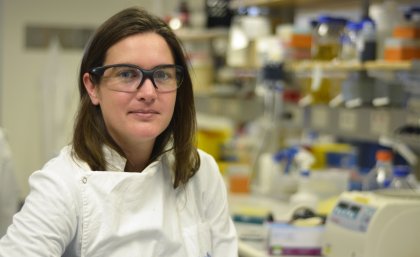Australian Researcher Honored for Discovery That May Lead to Anti-Inflammatory Therapy
Written by |

Dr. Rebecca Coll, a young researcher at the University of Queensland Institute of Molecular Bioscience, won the 2016 Research Australia Discovery Award for her work in identifying promising anti-inflammatory compounds that are able to block the NLRP3 inflammasome — a key driver of inflammation. The discovery could greatly benefit patients with inflammatory diseases, such as multiple sclerosis (MS).

Rebecca Coll, with the Institute of Molecular Bioscience at the University of Queensland. (Credit: University of Queensland)
Coll, who received the award at the Research Australia Health and Medical Research Awards ceremony, recently held in Sydney, led research into the biological characterization of a small molecule drug — called MCC950 — that inhibits the NLRP3 inflammasome and, possibly, its disease-causing inflammation.
“Uncontrolled inflammation contributes to the progression of many diseases including diabetes, arthritis, cancer, multiple sclerosis and neurodegenerative diseases such as Alzheimer’s and Parkinson’s,” Coll said in a news release. “We believe the NLRP3 inflammasome could be a fundamental factor driving the damaging inflammation associated with these diseases.”
Inflammasomes are cytosolic sensors that detect pathogens and danger signals. The NLRP3 inflammasome is known to be involved in the development of diseases such as MS, in which inflammation occurs when the body’s own immune cells attack the nervous system. In this context, drugs that are able to block the NLRP3 inflammasome might be a potential target against MS and other inflammatory diseases.
Coll and her colleagues at Queensland and Trinity College Dublin combine research with drug discovery and development — biology with chemistry — to better understand inflammation at the molecular and cellular levels.
“There are no drugs clinically available that specifically target NLRP3, which means our work is an important advance towards identifying a first-in-class therapy for patients living with inflammatory diseases,” Coll said. “I am absolutely thrilled to receive this award and feel that it recognises our fantastic collaboration between chemistry and biology which has driven this innovative research.”
Nadia Levin, CEO of Research Australia, said it was a privilege to distinguish Coll for her pioneering work.
“The potential implications of Dr Coll’s discovery for those living with these diseases are really quite exciting,” Levin said. “As the winner of our award dedicated to young researchers only five years out from their PhD, Dr Coll has certainly set herself up as ‘one to watch’. Research Australia is extremely proud to recognise Dr Coll for her work and we look forward to following the progress of this important area of research as it progresses towards the patient.”
A study on these efforts, “A small-molecule inhibitor of the NLRP3 inflammasome for the treatment of inflammatory diseases,” was published in Nature Medicine in February 2015, with Coll as the study’s first author. It details “the development of MCC950, a potent, selective, small-molecule inhibitor of NLRP3. … [an inflammasome whose] aberrant activation is pathogenic in inherited disorders … and [in] complex diseases such as multiple sclerosis.”
A company founded on the discovery, which is seeking patent protection, also recently raised $22 million (Australian) in a Series A financing round.
More information about Coll’s work can be found on the video below.


